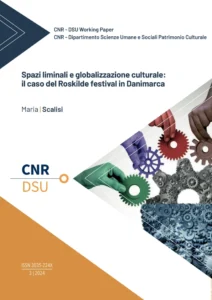
Working Paper 3-24
Liminal Spaces and Cultural Globalization: The Case of the Roskilde Festival in Denmark
Maria Scalisi
DOI: 10.36134/CNRDSUWP-2024-3 Download as .PDF
The Roskilde Festival, one of Europe’s largest and oldest music events, plays a crucial role in transforming the Danish landscape and integrating it into global networks. This study, conducted during a visiting period at the University of Copenhagen, investigates how the festival has driven globalization and reshaped the urban environment, fostering new social and cultural dynamics. It highlights temporary urban planning and cultural production as key drivers of local development, focusing on the experiential landscape of Roskilde’s temporary city and the festival’s liminal space. Drawing on Victor Turner’s concept of liminal space-an area where social and spatial norms are suspended to enable innovation and change-the festival is shown to create temporary communities and inspire new forms of socio-spatial expression, influencing both collective and individual identities. This research aims to understand how festivals catalyze globalization and territorialization processes to inform sustainable urban and cultural policies that maximize the positive impact of major events.
How to cite
Scalisi M. (2024). Spazi liminali e globalizzazione culturale: il caso del Roskilde festival in Danimarca (CNR-DSU Working Paper 3). CNR-Dipartimento di Scienze Umane e Sociali, Patrimonio culturale. https://doi.org/10.36134/CNRDSUWP-2024-3.
Last updated: 14 March 2025

